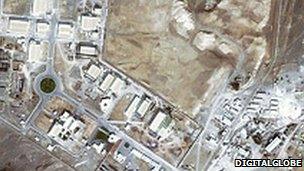More centrifuges fitted at Iran's Natanz plant, says UN
- Published

Iran has installed hundreds of new centrifuges at its Natanz plant, the UN's atomic agency says in a report.
The International Atomic Energy Agency (IAEA) said Iran had installed almost 700 advanced IR2m centrifuges at the plant, compared with 180 in February.
It again expressed concern about the "possible military dimensions" of Iran's nuclear programme.
But it said there had not been much growth of the most sensitive nuclear material - uranium enriched to 20%.
Tehran insists its enrichment activities are solely for civilian purposes, while the international community suspects Iran wants to be able to build nuclear weapons.
'Not yet operating'
Iran has been the target of four rounds of UN sanctions and numerous UN Security Council resolutions calling on it to cease enrichment work.
Israel has threatened to carry out air strikes on its long-time foe if its enrichment activities do not stop.
The new centrifuges at Natanz are not yet in operation, the IAEA said in a confidential report obtained by media organisations.
And it noted that no new equipment was being operated at Iran's Fordo plant - which is of more concern to Iran's critics, as it enriches uranium to a higher level of 20% than Natanz, which enriches to 5%.
There had not been much growth in the amount of the most sensitive, 20% enriched uranium. Uranium enriched to 90% is required for a nuclear weapon.
But the IAEA expressed concern about the Parchin site, saying Iran had asphalted over areas of the site in recent months - seriously undermining the agency's ability to conduct effective verification.
The IAEA said it had not been able to reach agreement with Iran on answering outstanding issues about its nuclear programme, "including those related to possible military dimensions".
Critics say Iran is trying to achieve the capability to make atomic weapons.
Iran denies this, saying it needs nuclear technology for energy generation and medical purposes and that it is Israel's reputed but unacknowledged nuclear arsenal that threatens regional peace.